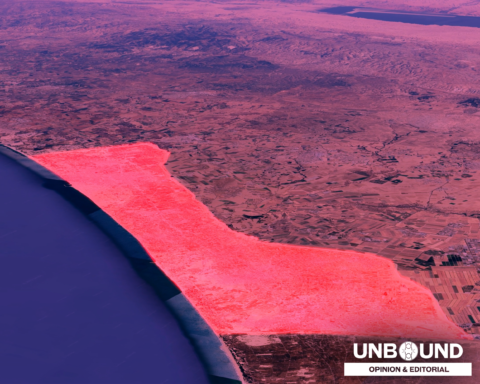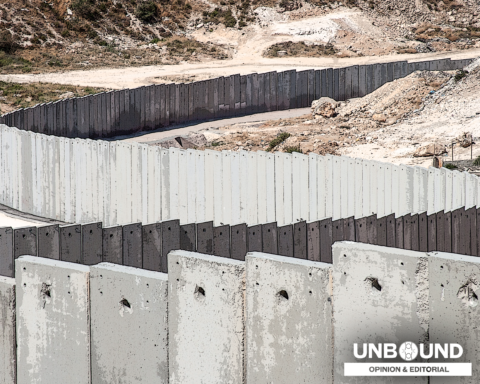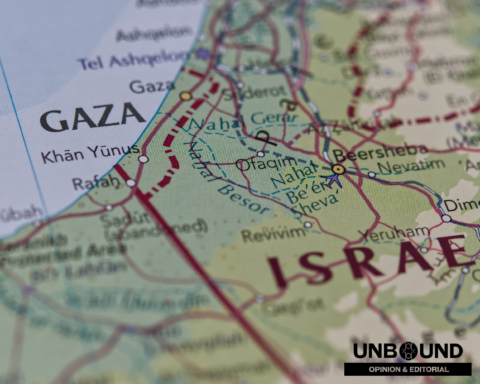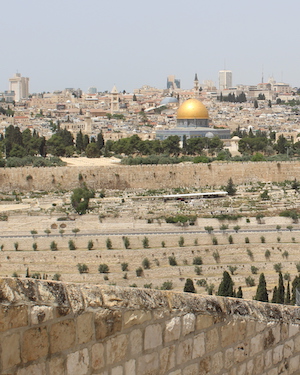A PC(USA) International Peacemaker Preaches Hope for Israel/Palestine.

In September, the Presbytery of Genesee Valley welcomed a PC(USA) International Peacemaker, Amal Nassar, as she led workshops describing her family’s experience living at the Tent of Nations (an organic farm near Bethlehem in the West Bank).
Events were held at eight churches in the Greater Rochester area: Penfield Presbyterian, Albion Presbyterian, Henrietta UCC, Gates Presbyterian, Third Presbyterian, Mt. Rise UCC, and Twelve Corners Presbyterian, as well as at Roberts Wesleyan College.
In Arabic, the name Amal means “hope”—and Dr. Nassar uses the name “Dr. Hope” for some of her professional work as a pediatric therapist. Her presentation, however, focused largely on the history and mission of the Tent of Nations, as well as the challenges the family has faced. The farm’s ownership dates back to the time of the Ottoman Empire—she shared photos of the tax documents under four different regimes—and the family emphasizes that the farm has been in use the entire time. (If the land had gone unused for three consecutive years, according to Ottoman law it would have reverted to state ownership).
___________________________________________
Amal’s father, Bshara Nassar, imagined the farm as a location for people of all nations to gather in peace….Consistent in the Nassars’ communication is the message, “We refuse to be enemies.”
___________________________________________
 Now mostly surrounded by five Israeli settlements in the West Bank, it has been a challenge for the farm to stay connected to the community of Bethlehem. Historically, the town was a meeting place for farmers who lived in the surrounding area—a very different model from the western norm of residents living within the town proper. Increasingly, walls within the “Area C” West Bank areas most closely controlled by the State of Israel make movement within those areas difficult for Palestinians.
Now mostly surrounded by five Israeli settlements in the West Bank, it has been a challenge for the farm to stay connected to the community of Bethlehem. Historically, the town was a meeting place for farmers who lived in the surrounding area—a very different model from the western norm of residents living within the town proper. Increasingly, walls within the “Area C” West Bank areas most closely controlled by the State of Israel make movement within those areas difficult for Palestinians.
Nevertheless, the Nassar family has maintained various forms of Christianity-inspired ministry from their hilltop farm. Amal’s father, Bshara Nassar, imagined the farm as a location for people of all nations to gather in peace. And so it is—with 7,917 international visitors in 2017, and 6,696 in 2018 (as of September). Visitors come to learn or to help out on the farm, planting olive and fruit trees and working the harvest. Local children come for summer camps. In 2018, the theme was “How to be a change-maker”. Consistent in the Nassars’ communication is the message, “We refuse to be enemies.”
The family’s peaceful orientation and documented ownership have not stopped the state of Israel from declaring the farm to be state land (1991, turning into an unresolved court case) or from issuing demolition orders for homemade water cisterns on the property—nor have they appeased settlers, who have been documented bulldozing fig and olive trees on the property. After one such incident in 2014, the family named a lone surviving fig tree “Steadfast Witness.”

Following these presentations, approximately 30 local church leaders and activists held a public witness rally at Twelve Corners in Brighton, NY, lobbying the state of Israel to seek a more just outcome for Palestinians and calling out the United States for its role in maintaining the status quo.
Mary Panzer, a member of Rochester’s chapter of Jewish Voice for Peace, thanked the PC(USA) for its collaboration, saying,
“It builds our morale to support one another in a cause that seems so important to support now. I’m glad to be here today, at Twelve Corners, which is really at the center of Rochester’s Jewish community. It’s especially important for us to be here today and visible among American Jews who rarely get enough information from the press or from their congregations.”
Professor Randall Stone of the University of Rochester stated,
“As a matter of human rights, Israel is denying the right of the people in [the Gaza strip and the West Bank] to be citizens—citizens somewhere. They have no citizenship, in any state. They don’t have basic protections that almost anyone in the world enjoys. And so ultimately, Israel faces a moral dilemma: do they choose to resolve it by abandoning their effort to control the occupied territories, or do they resolve it by acknowledging that they have annexed these territories, and treating the people who live there as citizens. They have to do one or the other.”
Rev. Richard Myers, a retired Baptist minister, cited U.S. military aid to Israel as amounting to $10.8 million/day and criticized the practice of such aid, saying that:

“A lot of it, maybe almost all of it, goes back to US military contractors—so it’s a slush fund actually, it adds to our military budget without looking like it does.”
(Israel has historically had fewer restrictions than other nations, when it comes to limiting their spending of U.S. military aid to U.S.-made military equipment. Nevertheless, much of its military aid is still spent on those products.)
Carl Horton, coordinator of the Presbyterian Mission Agency’s Peacemaking program, summed up the goals of the event:
“The Nassar Family’s experience on their land is one story among many that needs to be told. The church has an opportunity to not only amplify their story, but to accompany and align ourselves them and with all Palestinians and Israelis who seek a just and lasting peace.
In May of this year, our Mosaic of Peace Conference visited the Tent of Nations and the impact was profound. In many ways, the Tent of Nations is a microcosm of the broader situation in the West Bank—but the Nassar family is remarkable for its faith in a peaceful way forward.
We always hope for our International Peacemakers to raise awareness about world issues and draw attention to where God’s people are suffering. We are grateful for the opportunity to bring Amal Nassar to the Presbyterian Church (U.S.A.) in order to widen the circle of awareness of the family’s plight under occupation and to demonstrate our solidarity in their quest for justice.”
***
Author Bio: Originally from Brighton, NY, Henry Koenig Stone serves in Louisville, KY as Managing Editor of Unbound and Associate for Young Adult Social Witness to the Advisory Committee on Social Witness Policy, PC(USA). He visited the Tent of Nations earlier this year as part of the Peacemaking Program’s “Mosaic of Peace” throughout Israel and the West Bank, and prays for the brave spirits on both sides of the Wall who open their hearts and strive for peace.






Unbound Social